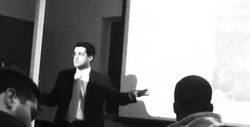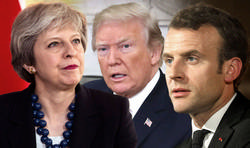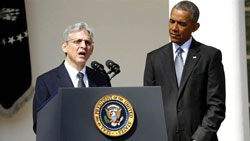Dr. Kevin Dooley, Dean of the Honors School at the University, gave a presentation on China as part of Global Understanding on April 5 to approximately 40 students, faculty and visitors. Dooley’s presentation was about how China is becoming an important country in understanding where the world is going. He started out with the fact that China is the second most Googled term worldwide. Dooley started by stating the question: “Why does China matter?”
Dooley mentioned the five major countries that will have major impacts in the next 50 years: Brazil, Russia, India, China and South Africa (BRICS). The unique part about China is that it is the only one not a democracy. “There is an old idea that wealth means democracy and that statement is being challenged by China,” Dooley stated during the presentation.
Dr. Rehka Datta, political science professor, who spent time in China last semester agrees with Dooley, “China has demonstrated tremendous economic growth, into the double digits. Government investment as well as opening of its economy has resulted in massive development of infrastructure, construction, education, the military, and other areas.”
An article in the New York Times by Charles Kupchan said, “Washington has long presumed that the world’s democracies will as a matter of course ally themselves with the United States; common values supposedly mean common interests. But if India and Brazil are any indication, even rising powers that are stable democracies will chart their own courses, expediting the arrival of a world that no longer plays by Western rules.”
Dooley stated during the presentation how the expansion of China’s middle class is worrying those in power. According to Dooley, once middle classes expand they want more protection, and this normally leads to a rise in democracy. This is referred to as the “Classical Economic Model.”
Dooley continued the presentation by going through a history of China. One of the major events in China’s history is when a student read the declaration to speed up political and economic reform by implementing constitutional rights, to fight corruption and the right to a free press not controlled by the government. Following this declaration, the military was sent to Tiananmen Square which was the center of the rise of democracy in China. It was here the famous picture of the student tank was taken. The death toll was between 400 and 800.
The most influential leader in Chinese history was Mao Zeding. He led the political group, the People’s Republic of China, which later turned into the Communist Party of China. The party is still in control today and has over 70 million members. Zeding believed that the peasants were the ones who controlled society. He wrote “The Little Red Book” which describes a classless society in China. Zeding’s political ideas came from the likes of Karl Marx and Leninism. Zeding also had the idea that the pesants would topple the upper class and this would allow him to reeducate the masses.
However Zeding met opposition. There were large protests, the largest being held at Beijing University. Since the government controls the press, there is no information critical of the government. Zeding claims that he allowed the protests to happen so that he could discover his enemies.
Eventually Zeding’s attempt at reeducation failed and he closed the schools. He arranged a group of youths known as the Red Guard, similar to Hitler’s Youth, who started destroying property and killing people. This rash action destroyed the economy.
Following Zeding’s death in 1975, a man named Deing Ziao Ping took over. Ping changed the landscape of China’s economy. He started to attract foreign investors and companies to do business in China. China’s GED rose 19 percent in the 1980s and 1990s.
The present leader of China is Hu Jintao. Under his rule China’s growth and employment has made strides but working conditions and wages have not. During the presentation, Dooley showed a video released by “ABC News” that showed employees that worked for American company, Apple. This video showed an entire metropolis that surrounded an Apple assembling plant where mobs will form in the streets for a chance at a job with the company. The comparison mentioned in the video for an American to join this type of operation was $23.00 an hour versus in China they would only receive $1.78 per hour.
Dooley also addressed how media censorship has led to information being shady. With the government controlling the press, no one criticizes the government on a large scale and leads to an uninformed mass. China has even censored some social media sites such as Facebook from displaying certain information. According to the United States State Department website, “The government has increased its efforts to reign in civil society, particularly non-governmental organizations (NGOs) involved in rights advocacy and public interest issues, and has stepped up attempts to limit freedom of speech and freedom of religion and to control the press, the Internet, and Internet access.”
China is one of the biggest contributors to the failing environment due to their consumption of energies especially coal. During the 2008 Olympics held in China, the Olympic committee had second thoughts of whether it was safe to hold the Olympics in China due to the poor air quality and smog. Dooley showed a picture of downtown Beijing, where the smog is so bad that skyscrapers are not visible a block away. Angela Don, a freshman English major, stated, “The most interesting part was the picture of the smog.” Dooley also mentioned about how, due to these conditions, cancer is a leading cause of death among Chinese citizens. “China’s continued reliance on coal as a power source has contributed significantly to China’s emergence as the world’s largest emitter of acid rain-causing sulfur dioxide and greenhouse gases, including carbon dioxide,” according to the State Department’s website.
Dooley was happy about how the presentation went. “I would hope that everyone understands that the United States is no longer the world’s lone economic power and that states like Brazil, Russia, India, China, and South Africa are going to dominate international affairs in the twenty first century,” stated Dooley. The article by Kupchan echoes this view. “Since the founding era, the American elite and the public have believed in the universality of their model. The end of the cold war only deepened this conviction; after the collapse of the Soviet Union, democratic capitalism seemed the only game in town.”
A Time Magazine article done by Eric Liu believes China’s competition can be good for the United States. “China’s ascent can be great for America. Competition forces us to make more disciplined choices, to activate more fully our creativity and ability to cultivate and elevate talent from anywhere. This is our secret weapon. No one adapts like the United States.”
Datta believes that China will be a force in the 21st century. “China’s boom is easily felt in China’s air – despite some challenges that the country faces, there is much optimism everywhere you go in China, enough to bring home the point that China will be a force to reckon with throughout much of the 21st century.
Dooley also took questions from the audience, most of which asked how the world will be changing when countries such as China, Russia Brazil, South Africa and India begin their rise on the international stage. Dooley said, “The biggest challenge today is the current structure of the Security Council. The current, permanent members are a product of the Cold War and are relics of an age gone by. To assume that Britain and France still possess the power that they once did is somewhat dangerous and to ignore the strength of countries like India and Brazil is naïve. The United Nations needs to be overhauled to better examine the true power relations of states.” Don would recommend this presentation to other students at the University. “If they (students) are interested in learning more about China and the inner workings of their government, then yes I would recommend it.”
PHOTO COURTESY of Christopher Orlando




